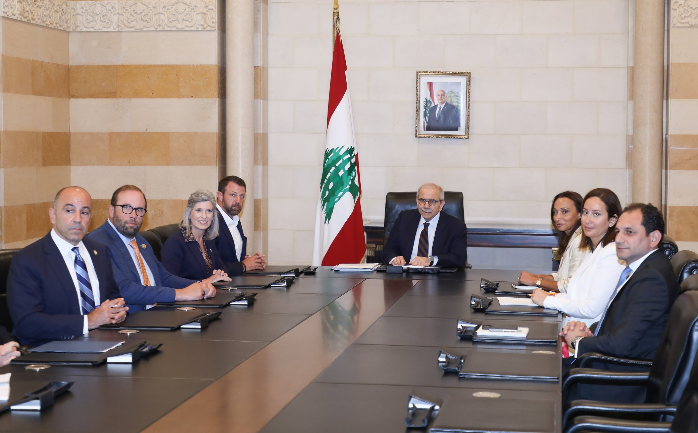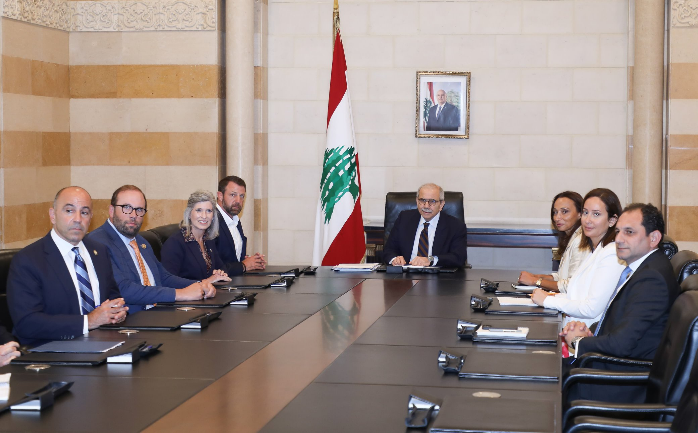 Salam with the American Congressional delegation (Lebanese Prime Minister’s Office X account, August 20, 2025)
Salam with the American Congressional delegation (Lebanese Prime Minister’s Office X account, August 20, 2025)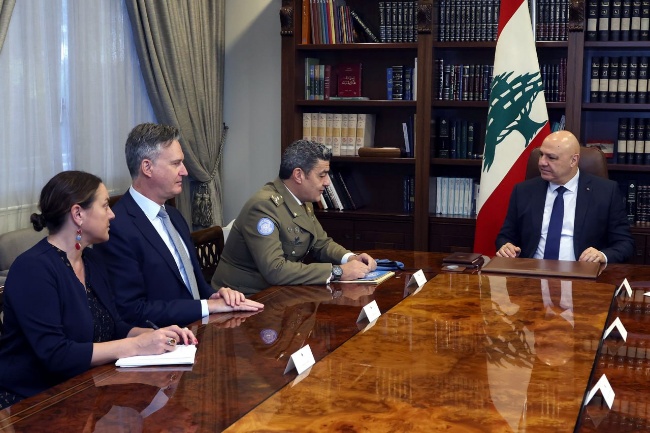 The president of Lebanon with the UNIFIL commander (Lebanese army X account, August 19, 2025)
The president of Lebanon with the UNIFIL commander (Lebanese army X account, August 19, 2025)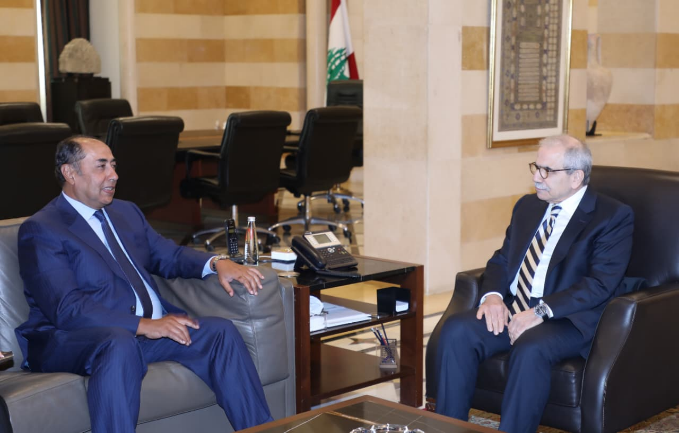 Salam (right) meets with Zaki (X account of the office of the Lebanese prime minister, August 21, 2025)
Salam (right) meets with Zaki (X account of the office of the Lebanese prime minister, August 21, 2025)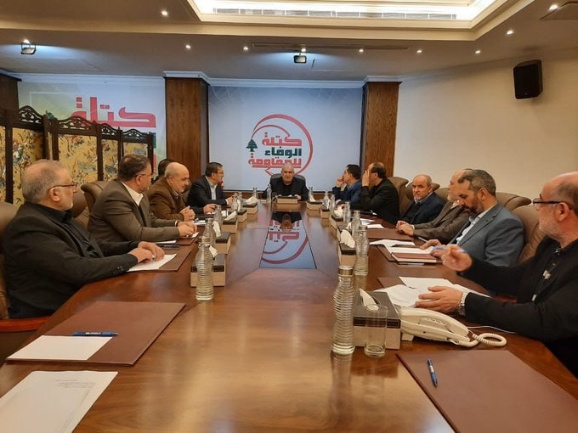 The Hezbollah faction in the Lebanese Parliament holds a meeting (al-Manar, August 21, 2025)
The Hezbollah faction in the Lebanese Parliament holds a meeting (al-Manar, August 21, 2025)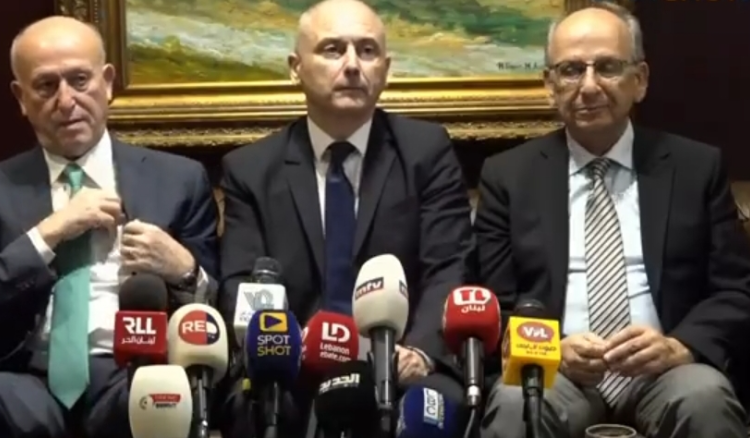 Members of parliament announcing the filing of the complaint against Qassem (Lebanese National News Agency, August 20, 2025)
Members of parliament announcing the filing of the complaint against Qassem (Lebanese National News Agency, August 20, 2025)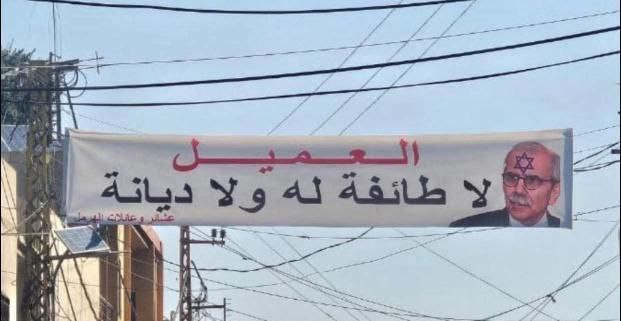 A sign hung in the al-Hermel area, s Hezbollah stronghold in the Beqa’a Valley, denouncing the Lebanese prime minister. It reads, “The collaborator has no sect and no religion” (Phalange Party X account, August 23, 2025)
A sign hung in the al-Hermel area, s Hezbollah stronghold in the Beqa’a Valley, denouncing the Lebanese prime minister. It reads, “The collaborator has no sect and no religion” (Phalange Party X account, August 23, 2025)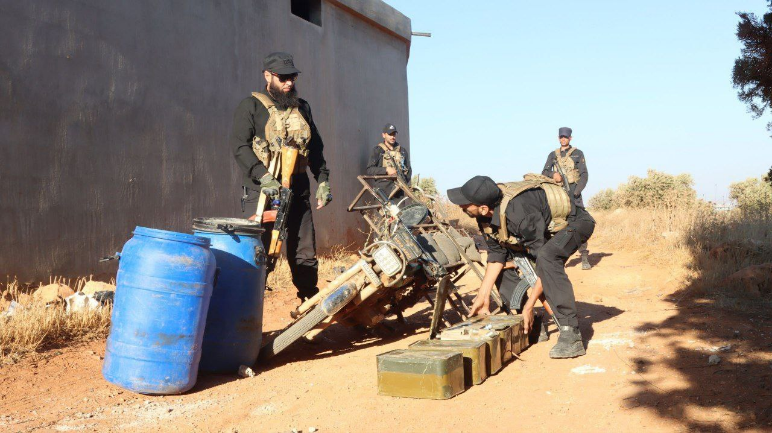 The motorcycle used for smuggling and the weapons (al-Ekhbariya al-Suriya TV, August 24, 2025)
The motorcycle used for smuggling and the weapons (al-Ekhbariya al-Suriya TV, August 24, 2025)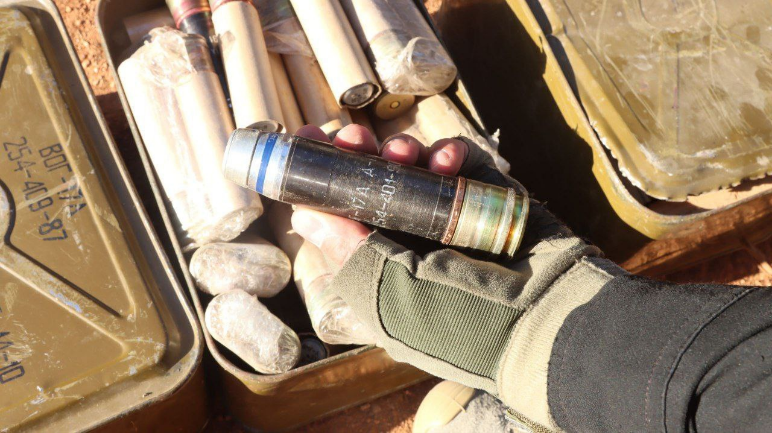 The motorcycle used for smuggling and the weapons (al-Ekhbariya al-Suriya TV, August 24, 2025)
The motorcycle used for smuggling and the weapons (al-Ekhbariya al-Suriya TV, August 24, 2025)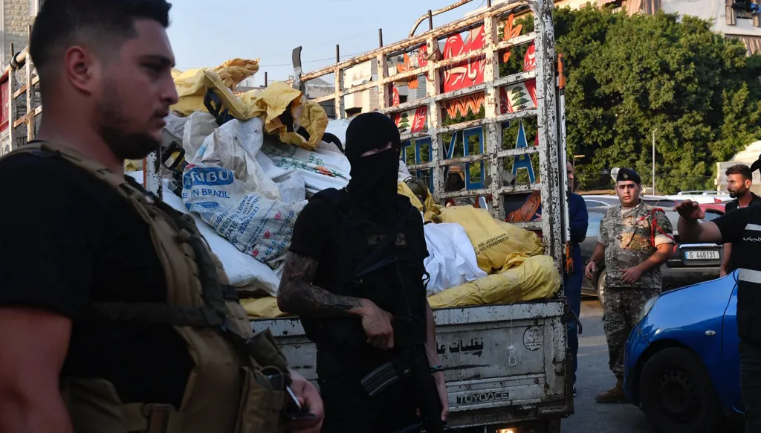 The weapons truck transferred to the Lebanese army (al-Nahar, August 21, 2025)
The weapons truck transferred to the Lebanese army (al-Nahar, August 21, 2025)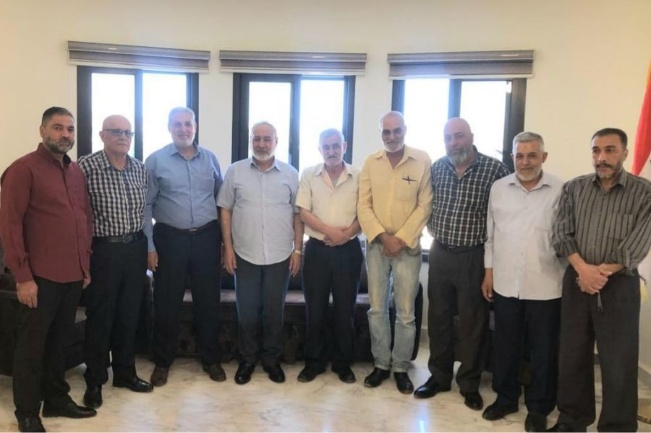 Hezbollah figure meets with representatives of the Palestinian terrorist organizations (al-‘Ahed, August 20, 2025)Overview[1]
Hezbollah figure meets with representatives of the Palestinian terrorist organizations (al-‘Ahed, August 20, 2025)Overview[1]
IDF forces attacked Hezbollah facilities and eliminated terrorist operatives as part of the continued activity against Hezbollah’s presence south Lebanon, which is in violation of the ceasefire understandings, and against the organization’s efforts to rebuild its military capabilities and restore its arsenal. The forces attacked weapons depots and rocket and missile launchers in south Lebanon and eliminated three Hezbollah terrorist operatives.
Hezbollah condemned the return of an Israeli citizen who had been held in Lebanon for a year and accused the government of irresponsibility and negligence.
The American special envoy to Lebanon, Thomas Barrack, visited Israel in an effort to reduce IDF attacks in Lebanon. The Israeli prime minister’s office stated that Israel was prepared to reduce its presence in south Lebanon if Lebanese security forces disarmed Hezbollah.
An IDF-Lebanese army coordination mechanism has reportedly transferred hundreds of coordinates of Hezbollah targets since the ceasefire in November 2024, some based on reports from residents in south Lebanon.
In preparation for the UN Security Council discussion on extending the UNIFIL mandate, Lebanese leaders emphasized the need for the UN force to remain. Parliament Speaker Berri wondered why the United States, as a guarantor of the ceasefire agreement, was trying to disrupt UNIFIL’s activity.
It was reported that the Lebanese army was about to finalize the plan to disarm Hezbollah and would present it to the Lebanese government on September 2, 2025. In an attempt to calm tensions following the government’s decisions regarding its weapons monopoly, contacts were renewed between the office of the Lebanese president and Hezbollah representatives, who continued to insist the organization did not recognize the government’s decisions and demanded they be rescinded. The Shi’ite mufti of Lebanon called Hezbollah’s weapons “the weapons of God” and said no one could take them.
Syrian security forces continue to prevent weapons from being smuggled from Syria into Lebanon for Hezbollah.
The Palestinian Authority and Fatah in Lebanon announced that the transfer to the Lebanese army of a truck full of weapons in the Burj al-Barajneh refugee camp in Beirut symbolized the beginning of disarming the Palestinians in Lebanon, adding that transfers would continue in additional camps in the coming weeks. Hamas and other Palestinian terrorist organizations said they would not give up their weapons until the “end of the Zionist occupation.”
The Ceasefire
The IDF
The IDF continued to attack Hezbollah targets in south Lebanon, in violation of the November 27, 2024 ceasefire agreement which prohibits the organization’s presence south of the Litani River, and to attack Hezbollah’s efforts to rebuild its military capabilities and restore its arsenal. The forces attacked weapons depots, rocket and missile launchers and other Hezbollah military facilities in south Lebanon, eliminating a Hezbollah operative engaged in restoring facilities (IDF spokesperson, August 18–25, 2025). The Lebanese ministry of health reported three killed in Israeli attacks in south Lebanon (al-Nashra, August 18–25, 2025). Hezbollah affiliated media confirmed the deaths of three operatives of the organization (Hezbollah in the Field Telegram channel, August 18–25, 2025). Lebanese media reported attacks in the Ansar and Deir al-Zahrani Ansar area in the Nabatieh district and in the al-Hush area in the Tyre district, claiming that surface-to-surface missiles were used in the attacks (al-Manar and al-Nabatieh Telegram channel, August 20, 2025).
Hezbollah
According to reports, Hezbollah evacuated most of its positions and its senior figures did not use their using cell phones for fear of an Israeli response. That was because the Lebanese leadership insisted the state monopoly on weapons be carried out “step by step,” that is, Israel would withdraw its forces from the five points in south Lebanon and stop the attacks before a decisive move to disarm Hezbollah (al-Nahar, August 20, 2025).
Ibrahim al-Moussawi, a member of the Hezbollah faction in the Lebanese Parliament, strongly criticized the return of an Israeli citizen who had been held in Lebanon for about a year and was released on August 21, 2025. He claimed that releasing the citizen without compensation and the return of Lebanese held captive by the “enemy” reflected the irresponsibility of the Lebanese authorities and their inability to meet their responsibilities. He added that the decision surprised Hezbollah and all Lebanese, and raised questions about “the negligence of the state in exploiting the opportunity to return our captives.” He claimed it was a message to the Lebanese that their leadership was not devoted to their cause and did not know how to use its powers, while [allegedly] “the enemy continues its crimes and violations” (al-‘Ahed, August 21, 2025).
The Lebanese Government
Nawal Salam, Lebanese prime minister, told a delegation of United States Congressmen, led by Oklahoma Senator Markwayne Mullin, that it was important for the American side to meet its responsibility and pressure Israel to stop its “aggression,” withdraw from the five points in south Lebanon and release the Lebanese detainees it was holding (Lebanese prime minister’s office X account, August 20, 2025).

Salam with the American Congressional delegation
(Lebanese Prime Minister’s Office X account, August 20, 2025)
The Lebanese President Joseph Aoun met with Illinois Congressman Darin LaHood and told him they were still waiting to hear the response which United States special envoys Thomas Barrack and Morgan Ortagus were supposed to bring regarding Israel’s position on the American paper of ideas. He said Lebanon had not received any official information regarding reports of Israel’s intention to establish a buffer zone in south Lebanon (Lebanese presidency X account, August 23, 2025).
Barrack visited Israel and met with Prime Minister Netanyahu to discuss the American administration’s request that Israel restrain its attacks in Lebanon (Israeli media, August 24, 2025). “Knowledgeable sources” reported that the Israeli side agreed to take steps to help promote the Lebanese government’s plan to hold a monopoly on weapons, but it was still unclear whether Israel was prepared to withdraw from one of the five points the IDF held in south Lebanon and to stop the attacks for a defined period. They also noted that the Lebanese authorities could not persuade Hezbollah and the border residents to agree to the idea of turning the border strip into an industrial area free of residents (al-Diyar, August 24, 2025).
The Israeli prime minister’s office then issued a statement welcoming the Lebanese government’s decision to disarm Hezbollah. The statement said that in light of the “important development,” Israel was prepared to support Lebanon’s efforts and work together for a safer and more stable future for both countries. Israel noted that if the Lebanese security forces took steps to disarm Hezbollah, Israel would take reciprocal steps, including a gradual reduction of IDF presence in coordination with the United States (Israeli media, August 25, 2025).
The Lebanese Army
“Lebanese and Israeli military sources” reported coordination between the IDF and the Lebanese army under the supervision of American officers with French and UNIFIL officers to prevent the outbreak of full-scale war. The coordination has reportedly been in force since the adoption of UN Security Council Resolution 1701 at the end of the Second Lebanon War in 2006, but its effectiveness has increased since the ceasefire in November 2024. The sides transferred hundreds of coordinates of Hezbollah military sites and weapons depots. A “Lebanese source” said that residents of south Lebanon also secretly provided information about the presence of Hezbollah weapons sites for fear that their homes would be attacked or the weapons would explode. The “source” added that most of the weapons confiscated by the Lebanese army were in poor condition due to IDF attacks and as a result there were casualties among the forces handling the weapons (al-Hurra, August 19, 2025).
Lebanese President Joseph Aoun met with a United States Congressional delegation led by Senator Markwayne Mullin to discuss the need to support the Lebanese army so it could fulfill its national duty and deploy in the south as far as the recognized borders, adding that Lebanon strongly opposed any reduction of those borders. He said the army needed supplies and equipment in addition to financial support, and efforts were being made to increase the army’s force in the south to ten thousand soldiers (Lebanese News Agency, August 20, 2025).
The Lebanese army denied allegations that a Lebanese officer was involved in a cover up of the killing of an Irish-born UNIFIL soldier in December 2022. The statement claimed the officer had coordinated with UNIFIL in exposing the circumstances of the incident, as part of the close, ongoing coordination between the Lebanese army and UNIFIL. The Lebanese army also took the opportunity to note that “the Israeli enemy” continued its attacks and “daily violations” of national sovereignty, continued “to occupy Lebanese lands and spread lies,” proving its “determination to undermine Lebanon’s internal security stability” (Lebanese army X account, August 22, 2025).
UNIFIL
Reportedly, the draft resolution to be presented to the UN Security Council regarding the renewal of the UNIFIL mandate, which expires at the end of August 2025, includes a French compromise stipulating that UNIFIL’s mission would be extended for another year, until August 31, 2026, while it prepared to withdraw. According to the report, the Security Council declared its intention to work towards UNIFIL’s withdrawal to make the Lebanese government the sole guarantor of security in south Lebanon. However, it was noted that it was still unclear whether the United States would accept or veto the proposal (LBC Lebanon, August 25, 2025).
In preparation for the Security Council discussion, Lebanese leaders noted the need for continued UN force activity to assist the Lebanese army in light of the “Israeli violations;”
Lebanese President Joseph Aoun met with UNIFIL Commander Diodato Avengara, and reiterated Lebanon’s commitment to the continued presence of UNIFIL forces, the completion of the Lebanese army’s deployment on the border and the importance of cooperation between the force, the Lebanese army and the civilians (Lebanese army X account, August 19, 2025). Nawal Salam, Lebanese prime minister, also met with Avengara to discuss the renewal of the force’s mandate (Lebanese government X account, August 21, 2025).

The president of Lebanon with the UNIFIL commander
(Lebanese army X account, August 19, 2025)
President Aoun told United States Congressman Darin LaHood that it was important to renew the UNIFIL mandate until the full implementation of Resolution 1701, with everything that entailed (Lebanese presidency X account, August 23, 2025).
Prime Minister Salam met with a United States Congressional delegation led by Senator Markwayne Mullin. He said it was important to renew UNIFIL’s mandate because of its role in maintaining stability and supporting the Lebanese army as it expanded its authority over all the areas of the south (Lebanese prime minister’s office X account, August 20, 2025).
Nabih Berri, speaker of the Lebanese Parliament, also met with the Congressional delegation. He related to reports that the American administration was acting to reduce support for the UNIFIL force. Berri said that they were surprised how the party that guaranteed Resolutions 425 and 1701 and the ceasefire agreement was the one acting against the UN forces. Berri also noted that the five-party mechanism supervising UNIFIL’s activity was headed by an American general and wondered how someone who was supposed to act for a ceasefire and end the fighting was undermining the efforts he himself was leading (Sawt Beirut International, August 20, 2025).
UNIFIL reported that its forces, in coordination with the Lebanese army, discovered a tunnel about fifty meters long and several unexploded bombs near al-Qusayr in the Marjayoun area in south Lebanon. Reportedly, according to Resolution 1701, the findings were transferred to the Lebanese army, and UNIFIL continued to patrol and act together with the army to help restore security and stability (UNIFIL Telegram channel, August 20, 2025).
Disarming Hezbollah[2]
The Lebanese Authorities
Preparations continue in Lebanon for implementing the government’s decisions from August 5 and 7, 2025, to ensure the state’s monopoly on weapons, including disarming Hezbollah. A “Lebanese military source” said the army had not requested an extension for submitting the plan to disarm Hezbollah and that its formulation was nearing completion and would be presented to the government on September 2, 2025 (al-Hadath, August 25, 2025). Before then, the United States special envoy to Lebanon, Thomas Barrack, and the deputy special envoy for the Middle East, Morgan Ortagus, were scheduled to arrive in Beirut on August 25, 2025, after their previous visit on August 18. “Lebanese sources” said Barrack was expected to meet with the Lebanese leadership and army command to review “operational missions and achievements in the disarmament process” and receive a briefing on the plan. “Presidential sources” said the weapons monopoly plan would be implemented in three stages and the government would show “flexibility” in extending the timeline for its implementation if the Lebanese army command deemed it necessary (al-Sharq al-Awsat, August 24, 2025).
Nawal Salam, Lebanese prime minister, reiterated that the decision regarding the state’s exclusivity on weapons had been made and that there was no intention of reversing it. Speaking in Tripoli, he said that without the decision there would be no security or stability, which were necessary for economic growth, and Lebanon would only be restored under the flag of one state, one army, and one law (LBC, August 18, 2025). After meeting with King Abdullah of Jordan in Amman, Salam said it was impossible to withdraw from the deadline for implementing the state’s weapons monopoly and the decision would not be canceled. He said the deadline given to Hezbollah to hand over its weapons to the state would not be extended, adding that he had asked King Abdullah to continue supporting the Lebanese army in dealing with the challenges it faced (al-Mamlaka, August 19, 2025).
This past week, there was international support for the Lebanese government’s decision regarding weapons:
Egyptian Foreign Minister Badr Abdelatty spoke by phone with Prime Minister Salam to discuss the developments in Lebanon and the region. Abdelatty expressed support for Lebanon’s efforts to expand state authority and said Egypt supported the Lebanese government, its security and its stability. He added that foreign interference in Lebanon and Israel’s attacks had to stop and the country’s sovereignty had to be respected. Salam expressed his gratitude for President el-Sisi’s support of Lebanon and its sovereignty (Extra News, August 20, 2025).
Hossam Zaki, assistant secretary general of the Arab League, met in Lebanon with President Aoun, Prime Minister Salam, Speaker of Parliament Nabih Berri, and Foreign Minister Yousef Rajji to confirm the Arab League’s support for expanding Lebanese state authority and restricting weapons possession. He said no one wanted Lebanon to slide into a situation which would have undesirable consequences (Lebanese presidency X account, August 21, 2025).

Salam (right) meets with Zaki
(X account of the office of the Lebanese prime minister, August 21, 2025)
United States Congressman Darin LaHood, who met with President Aoun at the head of a Congressional delegation, welcomed the Lebanese government’s decision to restrict weapons possession. He noted the United States’ willingness to support Lebanon until stability had been established and economic recovery achieved (Lebanese presidency X account, August 23, 2025).
Hezbollah
In an effort to minimize Hezbollah’s opposition to the government’s decisions, Aoun’s advisor Andre Rahal met with Mohammad Raad, head of the Hezbollah faction in the Lebanese Parliament (al-Nashra, August 23, 2025). “Well-informed sources” said that Raad emphasized the organization’s adherence to its position regarding the government’s decision on the weapons monopoly (al-Manar, August 23, 2025). “Sources” noted that meetings of the president’s envoys with Hezbollah representatives “had not produced results.” According to the report, Hezbollah representatives told the president and the Lebanese army commander that implementing the decision to restrict weapons to the state meant “confrontation.” The “sources” added that the organization’s decision to participate in cabinet meetings “did not indicate that there would not be escalation in the streets” and that Hezbollah had refused to accept implementation of “cosmetic steps” (al-Akhbar, August 23, 2025).
Hezbollah officials and the Shi’ite community remained defiant and dismissed the government’s decisions to disarm the organization, stating they were not prepared to discuss the future of the “resistance’s”[3] weapons until after Israeli “violations” ceased:
The Hezbollah faction in the Lebanese Parliament called on the government to revoke its decision regarding the weapons of the “resistance,” which it claimed “serves the occupation’s goals” and was contrary to the national interest and the Lebanese people’s legitimate right to self-defense. The faction claimed the government preferred “supporters of external enemies,” which represented a major failure and “complete surrender to foreign dictates, especially American, which favor the interests of the Zionist enemy over any other consideration” (al-Manar, August 21, 2025).

The Hezbollah faction in the Lebanese Parliament holds a meeting (al-Manar, August 21, 2025)
Mohammad Haidar, the Lebanese labor minister and a member of the Hezbollah faction, said disarmament would be discussed only after ensuring Israel’s withdrawal from the south, the cessation of attacks and the release of prisoners. He said Hezbollah supported a diplomatic solution and the strengthening of the Lebanese army but believed that the army lacked resources and needed international assistance to ensure security in the south and throughout the country (al-Alam, August 22, 2025).
Ali al-Muqdad, a member of the Hezbollah faction in the Lebanese Parliament, stated that the weapons of the “resistance” would not be given up, claiming they constituted “Lebanon’s guarantee against the Israeli enemy.” He said all attempts to undermine the role and status of the “resistance” would fail and that “the resistance will remain as long as the occupation continues.” He added that the Lebanese army did not have advanced weapons to defend the homeland (Lebanese National News Agency, August 24, 2025).
Sheikh Ahmad Qabalan, the Shi’ite mufti of Lebanon, said no force in the world that could disarm Hezbollah. He said that the decision to disarm the “resistance” was “insane, empty of content and cheap,” and there was “no more treacherous decision” for the state, its history and its sovereignty, since it served the “greatest interests of the Zionist entity.” He added that Hezbollah and Amal’s weapons were “the weapons of God” and that the Shi’ites were the only ones prepared “to shed blood for the nation” because it was “the sect of resistance” (al-Akhbar, August 19, 2025).
The al-Khanadeq news site, affiliated with Hezbollah and the “axis of resistance,”[4] quoted “sources” which claimed Shi’ite officers in the Lebanese army were worried about the government’s decision regarding Hezbollah’s weapons and expressed their dissatisfaction with it and the inability to confront their families and their people. The site claimed that “99%” of Shi’ites were eager to fight and defend the organization’s weapons and that most Christians, Druze and Sunnis also feared aggression from Syria and therefore preferred Hezbollah not to give up its weapons at “this sensitive time.” Reportedly, the Lebanese army itself feared aggression from armed groups in Syria, and the Lebanese army did not have the means, warehouses or equipment necessary to take and store Hezbollah’s weapons (al-Khanadeq, August 24, 2025). It was also reported that the army command had informed both country’s leaders and Hezbollah that it did not intend to take any action that would harm internal stability and would not allow any party to exploit existing tensions to bring about a confrontation between the army and Hezbollah (al-Akhbar, August 22, 2025).
Meanwhile, the threat made by Hezbollah secretary general Na’im Qassem in a speech on August 15, 2025, that the organization was prepared for an internal Lebanese confrontation if an attempt were made to disarm it, continued to trouble the political system and provoke angry reactions from Hezbollah’s rivals and former allies:
Lebanese Foreign Minister Yousef Rajji called the government’s decision “historic,” adding that those who spoke of civil war “intended to ignite one.” He said, “They [Hezbollah] issue threats. But who will they confront? The army, which enjoys the support of all the Lebanese people? It is the legitimate army, which is legally and constitutionally required to maintain the country’s security and to be the only institution, together with the other security forces, that is supposed to possess weapons.” He said the Shi’ite community was neither a target nor deprived and that it had rights like the other communities, but it was being held hostage by Hezbollah, which was trading on it and its rights. Referring to his refusal to meet Ali Larijani, the secretary of Iran’s Supreme National Security Council, during his visit to Lebanon, Rajji said that Lebanon had told the Iranians “again and again” of its opposition to interference in its affairs (al-Arabiya, August 20, 2025).
Lebanese Deputy Prime Minister Tarek Mitri said there was currently no concern about civil war in the country, and that despite the political rhetoric, including of Hezbollah and its rivals, no threats of internal confrontation or war with the army were being heard. He added that the positions of those involved expressed no intention of such confrontations, and therefore disagreements would continue to be handled within the political framework (al-Araby al-Jadeed, August 19, 2025).
Members of the Lebanese Parliament and party representatives in Lebanon held an emergency meeting in the office of Ashraf Rifi, a Sunni member of the Parliament, and warned that Qassem’s speech could lead to internal Lebanese tensions. Participants noted the importance of preserving stability in Lebanon and said they would file a complaint with the judiciary in the country against Qassem and others in accordance with the findings of the investigation (Lebanese National News Agency, August 20, 2025).

Members of parliament announcing the filing of the complaint against Qassem
(Lebanese National News Agency, August 20, 2025)
Gebran Bassil, the leader of the Free Patriotic Movement and formerly an ally of Hezbollah, said that they rejected Hezbollah’s threats and opposed threats of civil war. He added that they were not interested in an internal confrontation between the Lebanese army and Hezbollah, and they did not want the Shi’ite community to feel attacked and isolated. Bassil accused Hezbollah of not honoring the memorandum of understanding previously signed between the movement and the organization, according to which Hezbollah’s weapons were part of the state’s defense strategy. Bassil stressed that his movement did not support a war of “support for the Gaza Strip” but only a war whose purpose was “to defend Lebanon.” He said Hezbollah had deviated from the memorandum of understanding and used its weapons for “regional” rather than Lebanese purposes. In addition, Hezbollah’s weapons no longer deterred Israel, and therefore the organization had to be included under the state’s authority to defend Lebanon from Israel (al-Arabiya, August 20, 2025).
According to reports, the Lebanese Forces Party, led by Samir Geagea, was exerting pressure on President Aoun and Prime Minister Salam to make a final decision on the weapons monopoly, “even by force,” and the party’s ministers threatened to resign from the government. It was further reported that party officials were calling on visiting envoys to continue pressing Hezbollah and the government and to work to disarm the organization “by all necessary means” (al-Binaa, August 23, 2025). Charles Jabbour, head of media information for the Lebanese Christian Lebanese Forces Party, said he was not troubled by the fact that Hezbollah refused to give up its weapons, but by the organization’s claim that the weapons were essential for Lebanon’s security, even though they had not provided guarantees for Hezbollah’s leaders, operatives or supporters. According to Jabbour, despite the results, Hezbollah continued to market lies to the state and the people that Hezbollah’s weapons were the guarantee for security, while in fact they were endangering Lebanon and the Lebanese (Charles Jabbour’s X account, August 24, 2025).
The Maronite patriarch, Bechara al-Rahi, called on Hezbollah to hand over its weapons and declare its “absolute loyalty to Lebanon.” He stressed that Qassem’s message was exaggerated and in his assessment there would not be a civil war in Lebanon because the Shi’ite community was “tired of wars and wanted to live in peace.” He added that Hezbollah had to understand that the army would defend all the Lebanese and its loyalty had to lie exclusively with Lebanon and not with Iran. He added that Israel’s withdrawal would ease Hezbollah’s disarmament and Lebanon could make peace with Israel when the time was right (al-Arabiya, August 19, 2025). In consequence, the director of the Catholic Media Center, Abdo Abu Qassem, said that al-Rahi’s office had held contacts with Hezbollah political figures following the patriarch’s remarks. He noted the mutual accusations, but said national responsibility required thoughtful consideration and defusing the situation. He noted the need to convene a “spiritual summit” as soon as possible to clear the air, especially since any internal confrontation “served Israel.” According to Abu Qassem, although the decision on weapons exclusivity had been made at the highest levels, a way to do it had to be devised and there was need for wisdom, not provocation (Voice of All Lebanon, August 24, 2025).
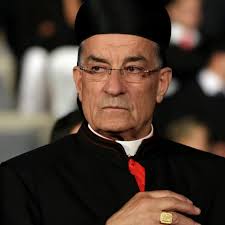
The Maronite patriarch al-Rahi (al-Arabiya, august 19, 2025)
In the wake of Hezbollah’s threats, “senior Lebanese security sources” reported that a joint Lebanese army-general security operations room would be established to formulate a security plan to deal with possible Hezbollah actions “intended to spark a civil war.” A “security source” stated that Hezbollah was developing a plan which depended on “a signal from Tehran” to create internal conflicts or tensions, either through the organization’s members or by recruiting popular support (Aram News, August 19, 2025).
“Sources” reported that Nabih Berri, speaker of the Lebanese Parliament, a close ally of Hezbollah, told the organization it would gain nothing from using the public in the streets and called on Hezbollah to cooperate more with the Lebanese army (al-Hadath, August 20, 2025). Nevertheless, the central unit for professional unions and workers in Hezbollah and the central workers’ office of the Amal movement called on workers, manufacturers and unions in Lebanon to join a rally on August 27, 2025, to denounce the government’s decisions on weapons, claiming they “contradict the supreme national interest.” Reportedly, the rally was intended to emphasize Lebanon’s right to maintain its sovereignty and the right of the people and the “resistance” to defend their land and liberate it from the “Israeli occupation.” The slogan of the event would be “We will not be humiliated!” reflecting the Shi’ite perception that death as a martyr was preferable to a life of humiliation (al-‘Ahed, August 25, 2025).

A sign hung in the al-Hermel area, s Hezbollah stronghold in the Beqa’a Valley, denouncing the Lebanese prime minister. It reads, “The collaborator has no sect and no religion” (Phalange Party X account, August 23, 2025)
Challenges for Hezbollah
Rebuilding Lebanon
An article in Hezbollah’s daily al-Akhbar accused Prime Minister Nawaf Salam of shirking his duty to rebuild and repair the destruction caused by the fighting against Israel, and as a result Hezbollah was about to close the “construction rehabilitation file” with payment for the extensive repair of damaged buildings in the Dahiyeh al-Janoubia in Beirut, estimated at $40 million. The article claimed that Salam had misled the citizens for half a year and left close to 500 damaged buildings in the Dahiyeh. It also claimed that Salam had other considerations unconnected to concern for some of his people, and did not listen to advice he received from Hezbollah because his submission to American pressure deafened him. The article also criticized Finance Minister Yassin Jaber, claiming he had not made an effort to help thousands of citizens who deserved to be supported (al-Akhbar, August 18, 2025).
It was also reported that in the Dahiyeh al-Janoubia many “For Sale” and “For Rent” signs could be seen, reflecting security fears pushing residents to try to leave the area quickly. Real estate expert Karim Abu Haidar claimed the sales were clearly not prompted only by economic reasons, but from a desire to move to areas considered safer or less politically and security-sensitive. One resident said she had been looking for an apartment to rent in Beirut for two months, but all the ads were offering houses for sale. She said people felt there was a movement of “undeclared migration” (Sky News Arabia, August 20, 2025).
Preventing Arms from Being Smuggled into Lebanon from Syria
Syrian security forces continue to foil attempts to smuggle weapons from Syria into Lebanon, apparently for Hezbollah. Internal security forces in near the border the Homs province ambushed a truck loaded with Grad rockets on its way to Lebanon; all the weapons were confiscated (Ekhbariya al-Suriya TV, August 19, 2025). Internal security directorate forces in the al-Qusayr area in rural Homs seized a motorcycle on its way to Lebanon, carrying ammunition boxes hidden inside barrels meant for transporting milk. The motorcyclist reportedly escaped and the authorities continue searching to locate those involved (al-Ekhbariya al-Suriya TV, August 24, 2025).


The motorcycle used for smuggling and the weapons
(al-Ekhbariya al-Suriya TV, August 24, 2025)
The Palestinians in Lebanon
Handing over Palestinian Weapons[5]
On August 21, 2025, the chairman of the Lebanese-Palestinian dialogue committee, Ramez Dimechkie, announced the start of the first stage of collecting weapons from the Palestinian refugee camps in the Burj al-Barajneh camp in Beirut. He noted that further collections would take place in the coming weeks in other refugee camps (Lebanese News Agency, August 21, 2025). Reportedly, Lebanese army soldiers, including an engineering unit, entered the camp with two small trucks, and afterwards one of the trucks left the camp with weapons inside sacks (al-Nahar, August 21, 2025). “Military sources” reported that medium and heavy weapons were transferred smoothly and calmly. They noted that similar collections were expected in the other refugee camps in Lebanon (al-Araby al-Jadeed, August 22, 2025).

The weapons truck transferred to the Lebanese army (al-Nahar, August 21, 2025)
The unexpected move confused the Fatah leadership in Lebanon. Immediately after Dimechkie’s announcement, Sabhi Abu ‘Arab, Palestinian national security chief in Lebanon, claimed they were “illegal” weapons brought into the refugee camp about 48 hours earlier (al-Jadeed, August 21, 2025). They allegedly belonged to Shadi al-Far, former head of the Palestinian embassy’s security unit, who was arrested by Lebanese military intelligence on August 20, 2025, on suspicion of arms trafficking, shooting and other offenses (al-Sharq al-Awsat, August 22, 2025).
However, Fatah figures in Lebanon and the Palestinian Authority claimed it was the first stage of disarming the Palestinian refugee camps, which was supposed to have begun in mid-June 2025 according to understandings reached between Palestinian Authority chairman Mahmoud Abbas and Lebanese President Joseph Aoun, but was postponed due to the Israel-Iran War:
Nabil Abu Rudeineh, spokesman for PA chairman Mahmoud Abbas, said that the Palestinian Authority and Lebanon had begun transferring weapons from the Palestinian refugee camps in Lebanon to the Lebanese army. It was reported that the understandings were based on the May 2025 meeting held by Mahmoud Abbas and the Lebanese president, which also included the establishment of a joint committee to manage camp affairs and improve refugee conditions, while preserving Lebanese sovereignty. He stated that the parties noted their commitment to the exclusivity of weapons in the hands of the Lebanese army (Wafa, August 22, 2025).
A “Palestinian security source” admitted that the weapons transfer was symbolic but meant to encourage the other “factions” to act the same way (al-Nahar, August 21, 2025).
“Fatah sources” said that even if the number of weapons transferred was not large, it was a genuine beginning and should not be underestimated. They said that what mattered was the political message of the first truck the army received, namely that the camps had begun their path back to Lebanese legitimacy (al-Jumhuriya, August 21, 2025).
Head of the communications department of the Palestinian security forces in Lebanon, Abd al-Hadi al-Asadi, claimed there was confusion about the transfer and a young man had violated the instructions and was expelled from Fatah, and the weapons he possessed were confiscated and handed to the army. However, they were taking a “first step” and there would be further steps when the Lebanese army was ready; the next step would be in the al-Buss refugee camp in Tyre. He said they had no problem with handing over the weapons and only wanted their children to live in dignity and obtain their rights under the aegis of the state (al-Araby al-Jadeed, August 22, 2025).
“Knowledgeable Palestinian sources” said weapons handover currently included Fatah and the PLO, since Hamas and other “factions” still refused. They said the factions’ stance increased Fatah’s resentment towards them (al-Sharq al-Awsat, August 22, 2025).
A “Fatah source ” said that the weapons handover had begun correctly at the Burj al-Barajneh refugee camp, and it would soon be completed with collections at the three camps south of the Litani River, especially al-Rashidiya, al-Buss and al-Burj al-Shamali, part of implementing UN Security Council Resolution 1701 and the ceasefire agreement between Israel and Lebanon (al-Rai, August 23, 2025).
However, Hamas and the other terrorist organizations said they were not prepared to give up their weapons. They said in a statement that what happened in the Burj al-Barajneh camp was an “internal Fatah organizational matter” and had no direct or indirect connection to the issue of weapons in the Palestinian camps. They claimed their weapons “have always been and will always be connected to the right of return and the Palestinian cause, and will remain so as long as the occupation of Palestinian land continues.” They claimed that the weapons would be used only “in the context of confrontation with the Zionist enemy” (al-Akhbar, August 21, 2025). Walid Kilani, a Hamas media operative in Lebanon, mocked the weapons transfer. He said the weapons filled only half the truck and wondered if those were all the weapons in Burj al-Barajneh. He called the move “media propaganda” to show that Mahmoud Abbas’ decisions were indeed being implemented, and he asked what would have happened if the rockets had exploded in the presence of the journalists covering the transfer. He said it was a sensitive issue which had continued for decades and had to be resolved by discussion and understandings (al-Araby al-Jadeed, August 22, 2025).
A “government source” reported that disarming the Palestinians would not stop and would be completed on September 2, 2025. He said Lebanese-Palestinian dialogue committee chairman Ramez Dimechkie planned to hold contacts with the “factions” opposing disarmament, led by Hamas and the Palestinian Islamic Jihad (PIJ). He said Hamas and its “partners” were unable to convince the Lebanese of the importance of their holding weapons, and would find no one to protect them except Hezbollah (al-Sharq al-Awsat, August 24, 2025).
Lebanese Prime Minister Nawaf Salam welcomed the beginning of the Palestinian weapons transfer. He said it would be completed with further transfers in the coming weeks from Burj al-Barajneh and other camps (Lebanese prime minister’s office X account, August 21, 2025). American special envoy Thomas Barrack also congratulated the Lebanese government and Fatah for agreeing to disarm voluntarily. He called it an important achievement resulting from the bold step taken by the Lebanese government, and it was a historic step toward unity and stability which demonstrated true commitment to peace and cooperation (Thomas Barrack’s, August 21, 2025).
The announcement of the weapons handover at the Burj al-Barajneh camp was preceded by a report of the visit to Lebanon of Yasser Abbas, the son of Palestinian Authority chairman Mahmoud Abbas, without the knowledge of the local Fatah leadership. While the alleged objective of the visit was to check property belonging to the PLO, “local sources” said that Abbas came to promote implementing the Palestinian weapons transfer and he was supposed to hold secret meetings with Prime Minister Salam and other senior Lebanese officials to present a plan for disarming the refugee camps south of the Litani River. Reportedly, Saudi Arabia was promoting a two-stage plan: the first was confiscation of weapons from the camps south of the Litani River, especially in al-Rashidiya and Burj al-Shamali, alongside a symbolic step in the Mar Elias camp in Beirut. The second stage was exerting pressure on the Lebanese government to ban Hamas activity in Lebanon, close the movement’s offices and expel its leaders from Beirut (al-Akhbar, August 19, 2025).
Coordination between Hezbolla and the Palestinian Terrorist Organizations
A delegation of the Alliance of Palestinian Forces in Lebanon, which included representatives of Hamas, the PIJ and the Popular Front for the Liberation of Palestine (PFLP), visited Hezbollah’s command center in the Beqa’a Valley and met with senior Hezbollah figure Hussein al-Nimr. Reportedly, the participants reiterated that “the resistance, in all its forms, was the only option to liberate holy places and occupied territories,” agreed that “peoples have the right to resist injustice and occupation” and expressed their full support for the Palestinian people and its “resistance” (al-‘Ahed, August 20, 2025).

Hezbollah figure meets with representatives of the Palestinian terrorist organizations
(al-‘Ahed, August 20, 2025)
Palestinians Arrested on Suspicion of Terrorist Activities
The intelligence directorate of the Lebanese army arrested three Palestinians for belonging to terrorist organizations and participating in numerous terrorist activities in the Ain al-Hilweh refugee camp in Sidon, including exchanges of fire and assassinations. The three, who were wanted for arms trafficking and smuggling from Syria to Lebanon, were arrested at the al-Awli checkpoint at the northern entrance to Sidon (East News, August 19, 2025; Lebanese army X account, August 20, 2025).
[1] Click https://www.terrorism-info.org.il/en to subscribe and receive the ITIC’s daily updates as well as its other publications.
[2] For further information, see the August 2025 ITIC report, Lebanese Government Decides to Disarm Hezbollah – Positions of Power Actors
[3] Hezbollah and the Palestinian terrorist organizations operating in Lebanon.
[4] Iran, Hezbollah, the Palestinian terrorist organizations, the Houthis in Yemen and the Shi’ite militias in Iraq.
[5] For further information, see the May 2025 ITIC report, Disarming the Palestinian Factions in Lebanon.
[6] Terrorist organizations.
Related Articles

